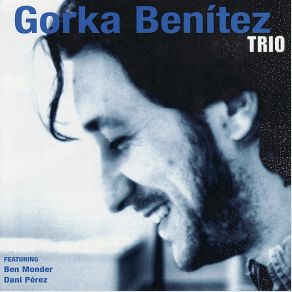Gorka Benítez Trio / Gorka Benitez Trio
Download links and information about Gorka Benítez Trio / Gorka Benitez Trio by Gorka Benitez. This album was released in 1998 and it belongs to Jazz, Latin genres. It contains 8 tracks with total duration of 40:27 minutes.

|
|
|---|---|
| Artist: | Gorka Benitez |
| Release date: | 1998 |
| Genre: | Jazz, Latin |
| Tracks: | 8 |
| Duration: | 40:27 |
| Buy it NOW at: | |
| Buy on iTunes $7.92 | |
Tracks
[Edit]| No. | Title | Length |
|---|---|---|
| 1. | Super-Zortzi | 4:09 |
| 2. | Blue Note Singes Again | 4:56 |
| 3. | De Romeria | 7:11 |
| 4. | Sual | 5:38 |
| 5. | Para Petra | 5:30 |
| 6. | Loisada | 5:18 |
| 7. | ¿En Que Tono Chabeli? | 2:04 |
| 8. | Trakeando | 5:41 |
Details
[Edit]Spanish tenorman Gorka Benítez has long been one of his country's leading jazz lights. His main contribution to the Barcelona scene has been as the filling the tenor chair in drummer David Xirgu's quartet (and Xirgu returns the favor here). With Raimon Ferrer rounding out the rhythm section and guitarists Ben Monder and Dani Perez guesting, Benítez gets an opportunity to reveal his considerable skills not only as a soloist and a bandleader, but as a composer as well. Benítez has a big, fat tenor tone that stands somewhere between the edginess of Gato Barbieri's and the warmth and resonance of Sonny Rollins'. His compositions are straight from the post-bop book, with a few interesting modal and rhythmic twists. On "Blue Note Singes Again," Xirgu plays a straight 4/4 that gets augmented in the middle section with a 7/ and then a 9/8. The blowing is easy and lyrical with everybody soloing on every track, which can be trying. Benítez's solos are filled with long, loping lines and limited chromatic range, but straight out of the blues. When the guitarists interact with the trio, as they do in one form or another on three tracks, the feeling is completely different. Monder and Perez add a fullness of texture and depth of color and sonance that is missing elsewhere. Benítez, too, seems more confident in blowing harder, letting his legato come to the surface more as well whenever there is a fourth or fifth person present, as on "De Romeria." As Monder plays a wild, high-string drone reminiscent of bagpipes, Perez moves into steep arpeggios and tonal shifting. Benítez waits his turn and comes out stomping, blowing through the guitars in the mix, turning them into one another contrapuntally. This isn't a perfect date by any means, but it is a useful one that provides great listening pleasure in laces; plus, it would be interesting to compare this to the other albums that come from Benítez.